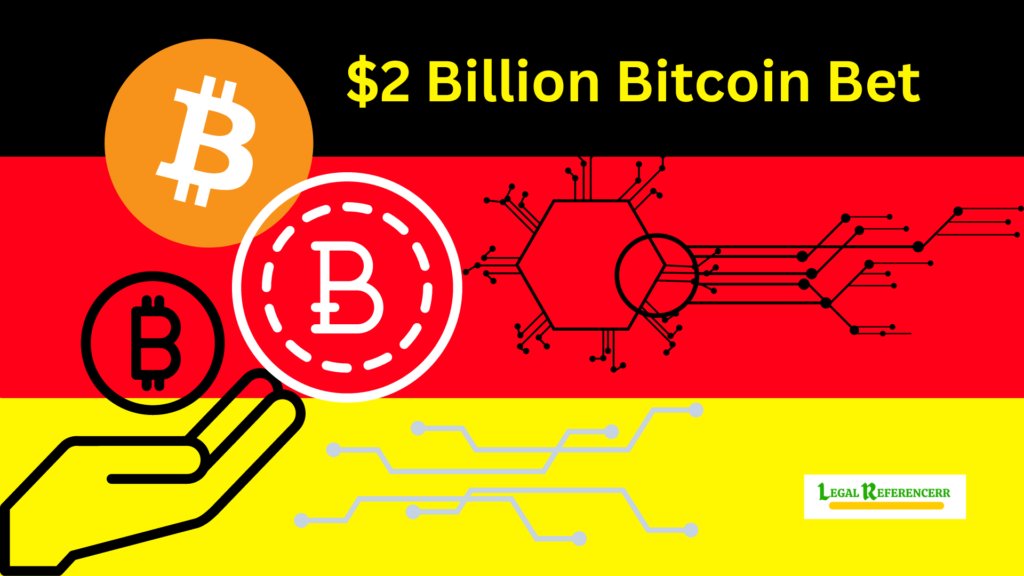Germany’s $2 Billion Bitcoin Bet- Will it Pay Off or Bite Back?
Germany’s $2 Billion Bitcoin Bet- Will it Pay Off or Bite Back?
The sudden drop in the value of bitcoin is mainly due to one major reason: the German authorities selling off a large amount of the digital currency. The Federal Criminal Police Office, also known as Bundeskriminalamt (BKA), has been steadily getting rid of their bitcoin holdings, with the latest sale happening in June.
Based on the analysis of on-chain data by Arkham Intelligence, the BKA offloaded 900 bitcoins in the previous month, fetching around $52 million in value as of the latest Monday. This considerable transaction is thought to have played a part in the sharp decline of the cryptocurrency, as it introduced a significant volume of coins into the market.
The seized bitcoins can be traced back to a defunct website that was involved in pirating movies. The BKA acquired the digital currency as a way to crackdown on unlawful online operations. The precise details of when and how much the government has sold bitcoins remains uncertain, but it is clear that Germany’s law enforcement is gradually selling off its assets in recent weeks.
The market has been greatly affected, as the value of bitcoin has seen a significant drop in the past few days. With more details emerging about the government’s transactions, experts in the market are expected to closely examine how they are influencing the price of the digital currency.
In the immediate future, the rise in supply resulting from the BKA’s sales could potentially drive down the value of bitcoin. Nonetheless, it is crucial to contemplate the lasting effects of these transactions. Countries globally are progressively recognizing cryptocurrencies as a valid category of assets, and their participation in the market has the potential to enhance stability and credibility.
With an increasing number of countries emulating Germany’s initiative and joining the digital currency market, there is potential for the overall industry to thrive. For now, it is essential for investors to stay alert and carefully observe market trends in order to make well-informed choices regarding their investment plans.
The recent sale of a large amount of Germany’s bitcoin holdings has caused a stir in the world of cryptocurrency, leading to a significant drop in the price of bitcoin. Last week, it was revealed that 3,000 bitcoins, which are worth about $172 million, were sold off. This was followed by another sale of 2,739 bitcoins, valued at around $155 million, by the German authorities on Monday.
The exchanges have probably been made easier through large digital currency trading platforms like Coinbase, Bitstamp, and Kraken, which have been pinpointed as important receivers of the state’s digital money reserves. Despite being reached out to by CNBC on Monday, the German government has not provided any comments on the issue yet.
Bitcoin price reaction
The consequences of these transactions have been keenly observed in the bitcoin industry, as the value dropped to under $55,000 on Friday, marking its lowest point since February 2024, as reported by CoinGecko. This abrupt and substantial decline is probably due to the rise in the number of bitcoins being introduced into the market, leading to a decrease in the asset’s worth.
It is important to point out that the timing of these transactions aligns with a time when the cryptocurrency market is experiencing increased unpredictability, potentially intensifying the effects of the government’s sales. Nonetheless, it remains uncertain whether this occurrence will have a prolonged effect on the value of bitcoin or if it will only be a short-term disturbance in an overall positive direction.
As the market progresses and additional data emerges, it is crucial to closely observe advancements to ascertain if this occurrence signifies a pivotal moment in the digital currency’s path or merely a small adjustment. Nevertheless, the offloading of a substantial amount of bitcoins is expected to have significant repercussions on the digital currency environment and merits careful scrutiny from investors and market contributors alike.
The latest changes in the cryptocurrency market have been extremely volatile, as the total market value of digital currencies dropped by more than $170 billion within a day, based on information from CoinGecko. This sharp decline is not just due to Germany’s sale of bitcoin, but also because of the repercussions of the Mt. Gox bankruptcy.
The representative of the Mt. Gox insolvency estate, Nobuaki Kobayashi, disclosed on Friday that reimbursements in bitcoin and bitcoin cash have initiated to be distributed to certain lenders via assigned cryptocurrency exchanges. This advancement has infused a significant amount of funds into the market, however, it is crucial to contextualize this sum. In light of the total token circulation of bitcoin, which is estimated to be approximately 19.7 million, with a value of around $1.1 trillion based on CoinGecko statistics, these repayments signify only a small portion.
Investors are closely monitoring the impact of these transactions on market sentiment. The influx of supply could have a substantial psychological effect, resulting in higher selling pressure and a decline in prices. Additionally, the recent sales from Mt. Gox’s reimbursement initiative might also heighten investor wariness, further adding to market instability.
As the cryptocurrency industry moves through these turbulent times, investors will closely monitor market changes, such as the speed and size of Mt. Gox’s reimbursements, and any possible changes in worldwide economic and regulatory landscapes. During this period, it is essential for investors to stay updated and adjust to evolving market conditions to reduce risk and increase potential profits.
The unexpected confiscation of 50,000 bitcoins by German officials, valued at around $2.2 billion, has caused ripples in the digital currency market. Although the effect on bitcoin prices might be insignificant, it has certainly influenced investor sentiment, as noted by James Butterfill, head of analysis at CoinShares.
Despite this major advancement, it is important to mention that the value of bitcoin has continued to increase by an impressive 89% in the last year. This shows the growing popularity and rising interest from institutions in this asset.

How Germany Came to Own $2 Billion in Bitcoin?
In January 2024, the Saxony police conducted a successful operation, seizing a significant amount of illegal funds. This marked a record-breaking accomplishment by law enforcement officials in Germany. The funds were confiscated from the individuals running Movie2k.to, a website known for engaging in movie piracy back in 2013. The money was then moved to a cryptocurrency wallet belonging to the Federal Criminal Police Office of Germany.
The significant incident underscores the growing significance of digital currencies in the worldwide financial realm. While authorities and law enforcement organizations tackle the complexities and advantages of decentralized money, it is probable that there will be additional prominent seizures and confiscations in the days ahead.
During this time, investors will closely monitor progress in the industry, especially in terms of clear regulations and growing popularity. The recent action by the German government to confiscate a significant amount of bitcoin demonstrates a strong stance against financial crimes and a dedication to safeguarding its people. Moving ahead, it will be intriguing to observe the developments in this particular case and the potential impact on the overall digital currency market. It is evident that the situation is critical, and the global audience is eagerly awaiting further updates.
ALSO READ: U.S. TREASURY ISSUES 2025 CRYPTO TAX GUIDELINES, NON-CUSTODIANS TO WAIT
As per information from Arkham Intelligence, a trusted monitor of blockchain transactions, the bitcoin holdings of the government of Germany have been moving since as far back as 2013, when they were first confiscated. Currently, the Bundeskriminalamt (BKA), the federal police agency of Germany, holds about 32,488 bitcoins. With a value of approximately $1.9 billion at present market rates, this large collection is a notable part of the government’s virtual riches.
Nonetheless, there are individuals who are not happy with the idea of trading these precious digital currencies. Joana Cotar, a representative in the German parliament, has conveyed her disapproval of the proposal. In a recent message on X (presumably Twitter), she recommended that the government should retain its bitcoin assets as a “strategic reserve currency” instead of selling them off. Cotar believes that selling the bitcoin would be unwise and detrimental.
Cotar sent a letter to the German leader Olaf Scholz, the finance minister Christian Lindner, and the Saxony regional leader Michael Kretschmer to express her worries. Additionally, she has extended an invitation to these leaders for a presentation on the 17th of October at the Paul-Lobe-Haus venue in Berlin, showcasing Samson Mow, a well-known bitcoin advocate. The objective of the gathering is to enlighten the officials about the advantages of holding onto the government’s bitcoin reserves.
The discussion brings attention to the intricate factors involved in overseeing virtual currencies by authorities. Whereas certain individuals may see the act of trading bitcoin as a way to make money and lower uncertainty, others believe that holding onto it presents a chance to spread out investments and possibly gain advantages in the long run. As conversations progress, it will be intriguing to see how Germany decides to tackle this digital currency dilemma.
Author:
